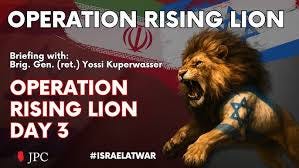Biblical Justification for Israel’s Attack on Iran Challenged by Palestinian Theologian
Netanyahu invoked the book of Numbers to justify war on Iran
Israel’s surprise military strike on Iran—justified by officials as a preemptive move to halt Iran’s nuclear ambitions—has taken on a religious dimension, with Israeli leaders citing biblical texts to support the assault. The operation, named “Operation Rising Lion,” has sparked criticism not only on political and legal grounds but also from Christian and Muslim theologians.
Prime Minister Benjamin Netanyahu invoked the Book of Numbers in support of the military action, quoting: “The people rise like a lioness; they rouse themselves like a lion that does not rest till it devours its prey and drinks the blood of its victims” (Numbers 23:24).
Israeli media have repeatedly broadcast this verse, reinforcing it as a religious justification for war.
Jonathan Kuttab, a Palestinian Christian lawyer and executive director of Friends of Sabeel North America (FOSNA), rejects this framing. He notes that Iran, despite widespread suspicion about its intentions, has consistently argued that nuclear weapons are forbidden under Islamic Shari’a law. “Even those who distrust the Islamic Republic acknowledge that Iran’s pursuit of nuclear capabilities would primarily serve as a deterrent,” Kuttab said. “It would not pose a direct existential threat to Israel but rather challenge Israel’s regional nuclear monopoly.”
Kuttab, who co-founded the Palestinian human rights organization Al-Haq, emphasized that Iran remains a signatory of the Nuclear Non-Proliferation Treaty, unlike Israel. “The entire purpose of international law and treaties like the NPT is to reduce the threat of nuclear war. Unfortunately, Israel’s position is that such international conventions are irrelevant. Only power matters.”
A pacifist and board member of Nonviolent International in Washington, D.C., Kuttab pointed to the teachings of Jesus in rejecting violent justifications: “Put your sword back in its place,” Jesus told Peter, “for all who draw the sword will die by the sword.”
The most theologically grounded critique of Netanyahu’s biblical reference came from Palestinian theologian Dr. Yohanna Katanacho, director of Nazareth Evangelical College and a respected voice among Arab evangelicals.
Born in East Jerusalem, Katanacho challenged the misuse of scripture to justify political violence. “The Israeli media keeps repeating this verse, summarized with one Hebrew word ke-lavi (like a lioness),” he said. “While some Jewish voices may support this reading, it is incompatible with the broader biblical context.”
According to Katanacho, the text from Numbers is being misapplied. “The verse is part of a poetic oracle intended to express divine blessing, not to justify bloodshed,” he explained. “Drinking blood is clearly forbidden in the Old Testament (see Leviticus 17:10-14; Deuteronomy 12:23). This image is metaphorical, and its violent interpretation ignores the deeper theological call to covenantal faithfulness, not militarism.”
Katanacho concluded that the truest path to divine blessing is faithfulness to the covenant, as fully embodied in Jesus Christ.
His argument sparked both support and debate online. Many praised the critique as “a well-supported biblical teaching,” while some pushed back. Jordanian Christian Philip Madanat responded by acknowledging that the Numbers passage is indeed poetic but insisted that it reflects the enduring significance of Israel’s identity and divine election, despite its moral shortcomings. He argued back to Katanacho saying, “But while you see this as misused for political militarism, a careful reading recognizes the enduring significance of Israel’s national identity and divine election even amid their moral failings. God’s covenantal promises to Abraham are unconditional in their ultimate fulfillment.”
Notably, most leading global spiritual figures refrained from invoking religious texts in response to the escalating Israeli-Iranian conflict. However, Pope Leo XIV expressed deep concern.
Speaking to an audience at the Jubilee of Sport in St. Peter’s Basilica, the Pope declared: “No one should ever threaten another’s existence.” The pope continued, “In these days, news continues to arrive that causes great concern. The situation in Iran and Israel has seriously deteriorated, and at such a delicate moment, I wish to strongly renew an appeal to responsibility and reason.”
Meanwhile, Islam’s highest religious institution, Al-Azhar University in Cairo, issued a blistering condemnation of Israel’s actions but used no religious terminology. In a statement, it called the Israeli strike a “blatant violation of national sovereignty, international law, and a direct threat to regional and global peace.”
Al-Azhar described Israel’s policies as among “the worst forms of occupation known in modern history” and warned that such aggression risks dragging the Middle East into further chaos. The statement urged the international community, the United Nations, and “all living consciences” to act urgently to stop Israel’s repeated violations of state sovereignty and international norms.
While previous Iranian governments have used religious texts to justify their anti-Israeli calls, the current government has refrained from such harsh anti-Israeli rhetoric, except criticizing Israel's war crimes in Gaza.
As theological voices across religious traditions weigh in, the debate underscores how the invocation—or manipulation—of sacred texts in times of war can shape, or distort, the global moral response.
***************************************************
Daoud Kuttab is an award-winning Palestinian journalist and publisher of Mihiliard.org, a website focused on Christians in Palestine and Jordan. He is the author of State of Palestine NOW, available in English, French, German, and audiobooks. Follow him on X @daoudkuttab and on Threads @daoud.kuttab



